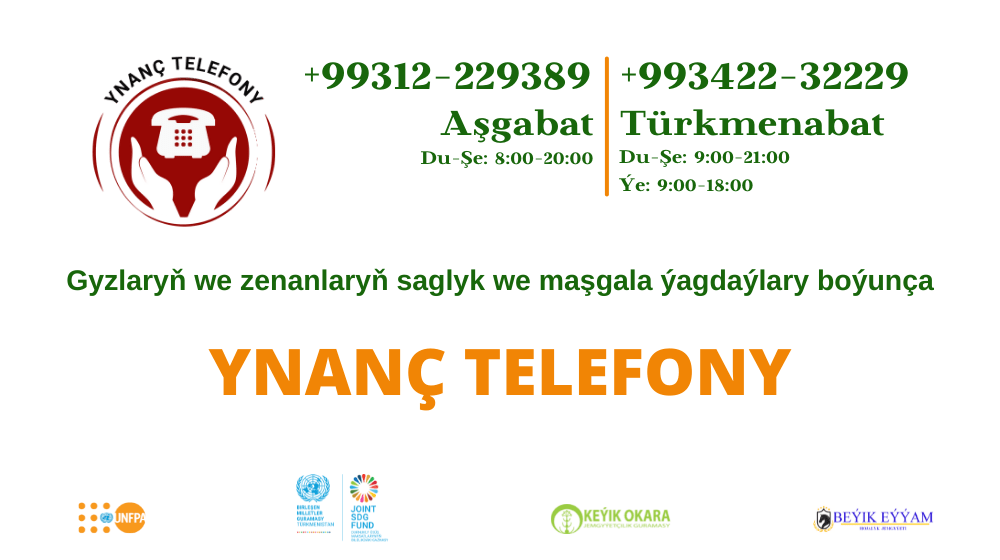After losing her husband, 36-year old Sulgun was gently encouraged by her in-laws family to move back with her parents. At a constant care of her 11-year-old son Serdar who has a disability, she neither had a job, nor was she welcomed at her parents’ home. Sulgun was temporarily settled at a balcony of two-room apartment where she endured tensions and violence from her father and other family members and soon was left homeless.
Globally, one in three women are subjected to gender-based violence mainly at the hands of their closed ones, husbands, boyfriends or like in case of Sulgun, her own father. These traumatic experiences seriously affect the health, productivity and the quality of life of a woman, her children, generations ahead, and have an impact on the communities and the entire nation.
Sulgun was in despair and had no friend or family who could support her, when she came across a Hotline ad.
“Every day we receive calls from women and girls who are in difficult life situations,” said Hotline consultant and social worker at the Keyik Okara non-governmental organization. “We assessed Sulgun’s situation and first referred her to the psychologist.” The NGO arranged a series of meetings for Sulgun with the legal specialist and labour exchange, as well as a family doctor and medical specialists to document her son’s medical history and the department of education to place him at a school.
September was a special month for both Sulgun and her son – she started a new job at plastic products processing factory. Serdar went to school for the first time at the health-improving educational complex of Ahal region. “I am finally starting to get back on my feet,” said Sulgun. “Every weekend I pick up my Serdar from school and we spend time together at a new apartment that I can now afford. My son can feel that I am no longer as stressed as I was before and now we have energy to fight for a better life,” she added.
“What is of utmost importance is that we need to raise the awareness of our women on their rights, especially reproductive rights,” said the NGO team. Lack of awareness is one of the reasons why nearly 60 percent of women in Turkmenistan do not make their own informed decision and choices about their reproductive health, usage of contraceptives and most intimate aspects of their life.
One of such Hotline callers was Nurjemal, a 26-year old mother of five children, one of whom had a vision impairment. Nurjemal was pregnant with her sixth baby when her husband left her and their children without a roof. Young mother with her children was placed at the NGO shelter and invited for the in-person sessions with the social worker, legal specialist, psychologist and reproductologist.
“Many women who are in difficult life situation often have numerous unwanted pregnancies and have never heard about the free existing services,” said the social worker. “We have 95 reproductive health rooms at the houses of health countrywide, where women with special health and socio-economic conditions can receive free contraception and all women can get a consultation on family planning for building a healthy family, and if needed, get a treatment before planning a healthy wanted pregnancy.”
***
The NGO Keyik Okara and Beyik Eyyam are two partners supported by the UN-Turkmenistan Joint Programme on social services who have started piloting community-based social services with focus on prevention and response to domestic violence and adolescent pregnancy. Both NGOs have a trained team of social worker, psychologist, gynecologist and a lawyer who provide telephone and, if needed, in person consultations.
The Keyik Okara Hotline on health and status of a woman and a girl in the family:
☎️ Ashgabat: +99312 – 229389, Monday to Friday 8:00 – 20:00;
The Beyik Eyyam Hotline on health and status of a woman and a girl in the family:
☎️ Turkmenabat: +993422 – 32229, Monday to Friday 9:00 – 21:00; Sunday 9:00 – 18:00.



